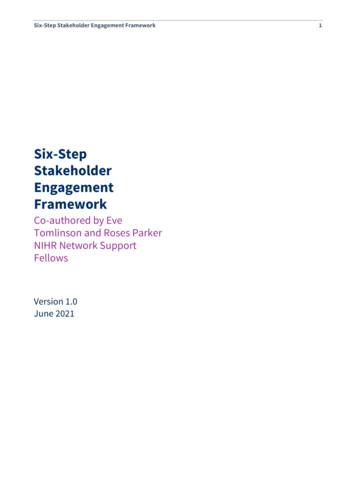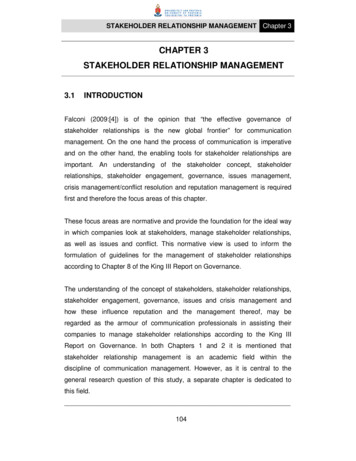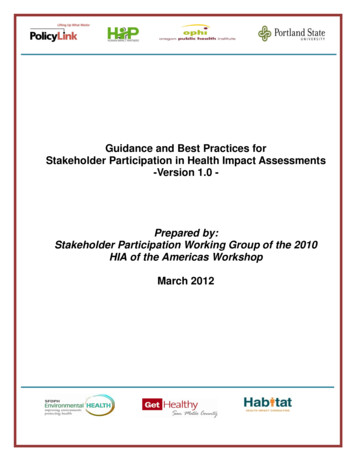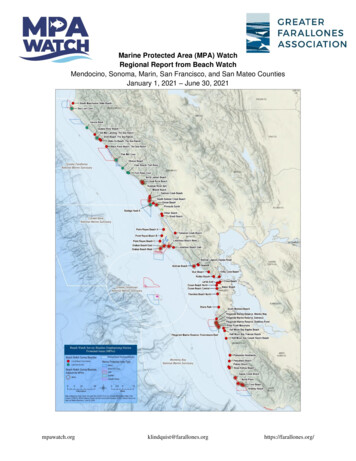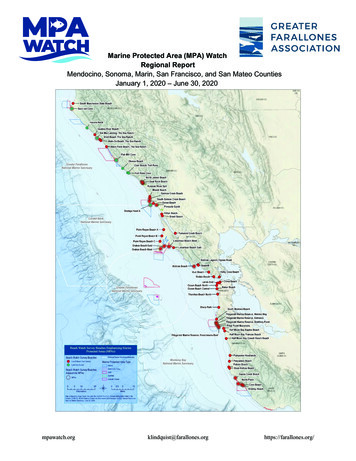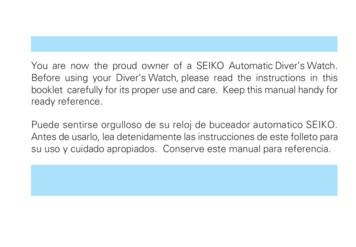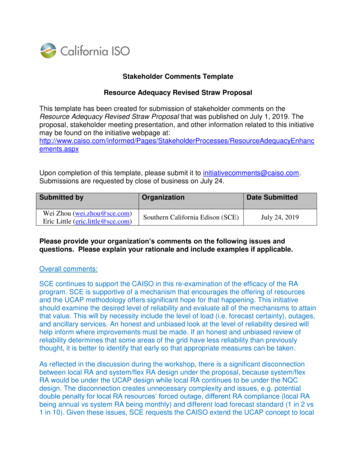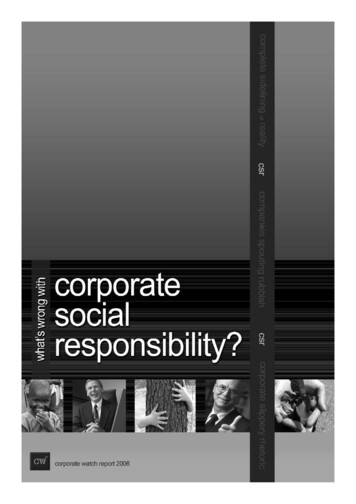
Transcription
Dear StakeholderCorporate social responsibility (CSR) evolved as a responseto the threat anti-corporate campaigns pose to companies'license to operate. But corporate social responsibility is acontradiction in terms. Companies are legally bound to maximise profits to shareholders. This duty to make moneyabove all other considerations means that corporations canonly be 'socially responsible' if they are being insincere. Anydoubtful social benefits from CSR are outweighed by thelosses to society in other areas. CSR is an effective strategyfor: bolstering a company's public image; avoiding regulation; gaining legitimacy and access to markets and decisionmakers; and shifting the ground towards privatisation of public functions. CSR enables business to propose ineffective,voluntary, market-based solutions to social and environmental crises under guise of being responsible. This deflectsblame for problems caused by corporate operations awayfrom the company, and protects companies' interests whilehampering efforts to tackle the root causes of social andenvironmental injustice.CSR does not pose any sustainable solutions. It can easily be reversed if the economic climate changes. As wellas being voluntary, it reinforces rather than challenges thepower of corporations. A genuinely socially responsiblecompany would look so different from today's corporations as to be unrecognisable.Tackling the big issues of overconsumption, climatechange and massive economic inequality requires majorshifts in our lifestyles and systems of social organisation.CSR seems to present us with an easy alternative – usingcorporate power as a lever for social change rather thanseeing it as an obstacle.Ultimately, CSR is not a step towards a more fundamental reform of the corporate structure but a distraction fromit. Exposing and rejecting CSR is a step towards addressing corporate power.Claire FausetCorporate Structures Researcher
Corporate Watch CSR Report 2006: ContentsIntroduction - 2Part 1: What is CSR? - 3 - 8Defining the concept - 3 - 5The business case for CSR - 5The evolution of CSR - 6 - 8Part 2: The case against CSR 9 - 21Problems with the concept of CSR: Can a company be socially responsible? - 9What is responsibility? - 9What is a corporation? - 9Problems with the practice: CSR isn't delivering - 10 - 11The leaders are highly unethical companies - 10 - 11Voluntary codes don't work - 11Socially Responsible Investment isn't enough - 11Corporations gain more from CSR than society does - 12 - 16CSR as Public Relations - 12CSR as a strategy for avoiding regulation - 13-Box: Lobbying against regulationLobbying for regulation - 14The market has no morality - 15-Box: Carbon trading as a solution to climate change?Can the consumer really change the market? - 16-Box: 'Race to the Top'CSR gives corporations legitimacy and access - 17 - 20Corporate citizenship: With responsibilities come rights - 17CSR as Public Private Partnerships - 17From privatisation to governance - 17Access to emerging markets - 18-Box: Business Action for AfricaIt’s good to talk? Why dialogue is not an appropriate response to corporate power - 19 - 20The limits of CSR - 21CSR isn't a sustainable solution - 21CSR can't challenge corporate power - 21Business as unusual? - 21Part 3: What would a socially responsible company look like? - 22Part 4: Why do we buy it? - 23 - 24NGOs - 23CSR workers - 24Consumers - 24Conclusion - 25References - 26 - 28Further Reading
IntroductionCorporate Social Responsibility is one of the hot corporate strategies of our era, butshould we trust companies to live up to their newly professed 'values'?This report aims to critique not only the practice of CSR, but also the concept. Manycommentators, despairing at the fact that companies have failed to clean up their actdespite so many claims of social responsibility, say that companies need to return tothe point of what CSR was supposed to be all about, to remind themselves of thesocial and environmental objectives that we are all supposed to be working towards.These commentators miss the fact that CSR was, is and always will be about avoiding regulation, covering up the damage corporations cause to society and the environment and maintaining public co-operation with the corporate dominated system.This report looks at:Why CSR exists.Arguments put forward by business to convince us that they are serious aboutsocial responsibility.What it would mean for a corporation to be socially responsible.Why this is incompatible with the way the corporation is structured.Why the corporation can never disinterestedly work for the public good.As a criticism of CSR, this report aims to provide readers with the tools to seethrough the spin. It also aims to be provocative, to challenge those involved in theCSR industry, as NGO workers, CSR professionals or consumers, to question theunderlying assumption that companies as currently constituted can be part of a shiftto a more sustainable and socially just society. This report aims to push a more radical edge in the debate around CSR. As such it does not claim to have all theanswers and invites open exchange.
Part I: What is CSR?Defining the conceptCorporate Social Responsibility is.a concept whereby companies integrate social and environmental concerns in their business operations and intheir interaction with their stakeholders on a voluntarybasis. European Commission1.the commitment of business to contribute to sustainableeconomic development, working with employees, their families, the local community and society at large to improvetheir quality of life.' World Business Council on SustainableDevelopment2CSR describes the principle that companies can and shouldmake a positive contribution to society. CSR is the practice ofmanaging the social, environmental and economic impacts of thecompany (dubbed by SustainAbility the 'triple bottom line'3),being responsive to 'stakeholders' (those who are affected by abusiness operation) and behaving according to a set of valueswhich are not codified in law. In practice the term can refer to awide range of actions that companies may take, from donating tocharity to reducing carbon emissions.Cause-related marketing– Cause-related marketing, such asTesco's highly successful 'computers for schools' promotion, is apartnership between a company and a charity, where the charity's logo is used in a marketing campaign or brand promotion.Companies choose charities which will attract target consumers.The charity gains money and profile, and the company benefitsby associating itself with a good cause as well as increasingproduct sales.Sponsoring awards – The Reebok Human Rights Awards,Nestlé's Social Commitment Prize and the Alcan Prize forSustainability are high profile examples of corporate sponsoredaward schemes. Through award schemes, companies positionthemselves as experts on an issue and leaders of CSR simply bymaking a large donation.This report looks primarily at CSR as practised by major companies, rather than what the New Economics Foundation hastermed 'ethical pioneers'4: smaller companies which are set upwith social and environmental concerns as their primary motivation in doing business, such as Fairtrade companies or socialenterprises.The type of activities companies undertake in an attempt tobe seen as socially responsible include:Corporate philanthropy – Donating to charities is a simple andreputation enhancing way for a company to put a numericalvalue on its CSR 'commitment'. McDonald's network of RonaldMcDonald Houses to 'improve the health and well being of children', and BP's sponsorship of the National Portrait Award aretwo high profile examples. Because it is easy and very PR friendly, corporate giving is more easily dismissed as a PR exercisethan other forms of CSR. In an effort to respond to this criticismcompanies are shifting to making larger donations to a smallernumber of charity 'partners' and combining giving with otheractivities.Codes of conduct – Corporate codes of conduct are explicitstatements of a company's 'values' and standards of corporatebehaviour. Codes vary in content and quality from company tocompany, and cover some or all of the following issues: the treatment of workers, consumer reliability, supply chain management,community impact, environmental impact, human rights commitments, health and safety, transparency and dealings with suppliers, and other issues. Some codes are monitored by externalverifiers. In many cases these are large accounting firms such asErnst & Young or PricewaterhouseCoopers. This has led to thecriticism that monitors will place the aims of the company, andnot the environment or society, at the forefront when carrying outtheir assessment. Junya Yimprasert of the Thai LabourCampaign accuses these monitoring consultancies of'turn[ing]workers’ lives into business opportunities'5.3
Social and environmental reporting– Linked to codes of conduct, reporting on social and environmental performance, as pioneered by Shell6, is a mainstay of a company's CSR efforts. 77of the world's 100 largest companies now produce CSR reports7.Reports purport to improve corporate accountability to stakeholders, but their value is increasingly being questioned for a numberof reasons: there are no common benchmarks with which tocompare the performance of different companies; the content isdown to the discretion of the company, leading to allegations ofspin; there are problems with verification; and the expectationthat a wide variety of stakeholders would make use of the reportsis proving incorrect. The readership of reports is largely restricted to the socially responsible investment community.Stakeholder engagement –Stakeholders are the individuals orgroups affected by the activities of the company, for example: thecompany's employees, shareholders, customers, communitiesliving in the vicinity of the company sites, and staff in the supplychain. In some stakeholder dialogues, an empty chair is left, representing stakeholders that cannot speak for themselves (e.g.the environment or future generations). However, decisions onwhich groups of people count as stakeholders and the mechanisms through which they are engaged, are entirely at the discretion of the company. (See section on dialogue.)part I: what is csr?Community investment– Many companies develop communityprojects in the vicinity of their sites, to offset negative impacts or'give back' to the community and local workforce. Communityinvestment covers a whole range of initiatives including: runninghealth programmes, sponsoring schools, playgrounds or community centres, employee volunteering schemes, or signing amemorandum of understanding with communities affected by acompany's impacts. However, this creates concerns aroundcompanies taking on public functions, and public spaces becoming private. (See section on privatisation.)Eco-efficiency – Eco-efficiency was the phrase coined by theBusiness Council for Sustainable Development in advance of theRio Earth Summit to describe the need for companies to improvetheir ecological as well as economic performance8. Minimizingthe company's environmental impact, particularly around highlyvisible aspects of its operations or in areas where it makes financial savings, is a particularly popular tactic amongst companieswhose products are inherently destructive to the environment.For example, an oil company installing solar panels on the roofsof its petrol stations and reducing the carbon emissions of itsoperations whilst remaining committed to a continual increase inoil and gas production.Investing in socially focused companies - A current trendsees large multinationals buying up smaller companies that havebeen set up with ethics as a primary guiding motivation, forexample Unilever's purchase of Ben and Jerry's or BP's buyouts of solar companies. In these cases the multinational is ableto buy up the smaller company's reputation once the risks havebeen taken.4
The business case for CSRCompanies engage in CSR because, for a number of reasons, they think it will be good for their profit margins. Thebusiness case for CSR emphasises the benefits to reputation, staff and consumer loyalty plus maintaining publicgoodwill.Reputation management– Increasingly, corporations are trading not on products or services but on their reputations, brandvalue, 'goodwill', and 'intellectual capital'. These are termed'intangibles' and have an actual numerical value on the company balance sheet. For example, 96% of Coca Cola's total valueis intangibles9, and an estimated 53% of the total value of theFortune 500 companies, worth 24.27 trillion, is made up ofintangibles10. With 85% of consumers reporting that they have amore positive image of a company that is seen to make the worlda better place11, CSR is an essential strategy for ensuring thecompany’s reputation.Risk management– Investing in a company is a gamble andinvestors want to see that a company is a safe bet. CSR meansthat companies have to be aware of the issues which mightcause them to be targeted by campaigners. This doesn't necessarily mean cleaning up their act. It can equally mean trying tooccupy the ideological space around an issue or getting decisionmakers to agree with their point of view with a few strategicdonations. One Ethical Corporation article, entitled 'Stealing theNGO's Thunder'12 advised companies, as part of their CSR work,to 'develop at an early stage intellectual leadership in public onissues that in the future may present NGOs with opportunities forcritical campaigns', by, for example, developing corporate positions and speeches for CEOs, presenting the issue in interestingand innovative ways to generate positive headlines and commissioning research from 'credible institutions', and funding corporate front groups - supposedly independent research groupsfunded and controlled by the company13.CORPORATE FOCUS: BPBP's strategy of appropriatingthe language of environmentalists and positioning itself as asocially responsible companyon the issue of climate changeby buying up a solar company(for a fraction of the amount itspends on oil acquisitions) is aclear example of a company attempting to take intellectualleadership of an issue where it finds itself criticised, and hasbeen well documented elsewhere.14Employee satisfaction– With 3 out of 5 people reporting thatthey want to work for a company whose values are consistentwith their own15, being seen by employees as a responsible company as well as a fair employer helps to attract and retain thebest staff. This only applies, however, when a company caresabout the quality of its staff. Companies will go to great lengthsto appear socially responsible to white collar or skilled workers intheir offices in Northern countries. Unskilled workers in developing countries, and casual workers in the North, are rarely afforded the same labour rights, not to mention the volunteeringschemes or welfare packages that the same company offers itsmore privileged workers.Investor relations and access to capital– Many investors consider more 'socially responsible' companies to be more secureinvestments. 86% of institutional investors believe that CSR willhave a positive effect on business16. Also, a growing number ofinstitutional investors have some kind of socially responsibleinvestment portfolio and therefore favour companies that areseen as socially responsible. (See section on socially responsible investment).Competitiveness and market positioning– CSR is still breaking into the mainstream. Investing in CSR now means that acompany can position itself as the market leader in its field, andwill be ahead of the game if regulations are brought in or whenother companies in the sector take up CSR as a business strategy. Buying out ethical alternative businesses, for exampleCadbury's recent purchase of Green & Blacks, supermarketsales of organics or Nestlé's move into fairtrade coffee, is oneway that companies are able to cement their market position,and also control profits from niche markets.Operational efficiency– CSR can save money. Some environmental measures such as minimising waste or saving energycan also reduce operational costs. These are often the type ofmeasures prioritised by companies. But what happens if measures necessary to protect the environment are not profitable?Maintaining the license to operate – Mistrust of corporations iswidespread, if for no other reason than that few people even inthe rich world actually gain from the level of power corporationshave been granted in society. More and more people reportincreased stress, harder work and greater insecurity as theychase elusive gains. Companies see that the tacit license tooperate society grants them is under threat. Their response is toattempt to convince society that they have a positive impact.CSR consultancy SustainAbility has described CSR as 'helpingto prevent the unfolding backlash against globalisation andreverse the recent erosion of trust'17.5
The evolution of CSRJust as the corporation’s history of social and environmental damage dates back to the East India Company, equallythe concept of corporate responsibility is not new. Whilesome corporations have taken every opportunity to makeprofit regardless of the impacts on society, benefiting fromthe slave trade, colonialism and war, there is equally a history of a small minority of companies taking a more philanthropic approach by (to some extent) considering the needsof employees or assisting the poor18. The creation of cooperatives and mutuals as alternative forms to the corporation reflects the long- standing concerns around the impactsof corporations. There has never been a heyday when corporations acted for the benefit of society. But the unprecedented power of corporations in recent decades, togetherwith an informed and educated general public, has createda real threat to the legitimacy of the corporation, which CSRseeks to counteract.Evolution of the conceptThe phrase Corporate Social Responsibility was coined in 1953with the publication of Bowen's 'Social Responsibility ofBusinessmen', which posed the question 'what responsibilities tosociety can business people be reasonably expected toassume?'19. Writing on the subject in the 1960s expanded thedefinition, suggesting that beyond legal obligations companieshad certain responsibilities to society20. In 1984, the celebratedmanagement consultant Peter Drucker wrote about the imperative to turn social problems into economic opportunities21.Throughout the 70s and 80s academic discussion of the conceptof CSR grew, but the first company to actually publish a socialreport was Ben and Jerry's in 198922, and the first major company was Shell in 199823 .important for gaining listings in certain stock exchanges andexport credits.24The UNCTC code of conduct, however, aimed to regulate corporate abuse rather than to facilitate corporate access to new markets, and unsurprisingly was less successful. The code mighthave been a useful tool for controlling corporate excess, but thebody was dismantled under pressure from corporations andinstead merged into the UN Conference on Trade andDevelopment - a body which promotes foreign investment25.Anti-corporate backlashThe rise in anti-corporate activism over environmental andhuman rights issues made a shift in corporate attitudes towardssocial and environmental issues essential. The 70s and 80s sawmajor international boycotts of companies investing in SouthAfrica, notably Barclays Bank, and the Nestlé boycott over thecompany's aggressive milk formula marketing strategies in theglobal South. This period was typified by confrontational campaigning that forced change from companies by attacking thebrand26. In the 1990s corporate lobbying effectively underminedattempts to regulate their activities at a global level. Instead itachieved an extension of corporate power both logistically,through improved transport and communications, and legally,through international agreements such as the GeneralAgreement on Trade in Services (GATS), and the Trade RelatedIntellectual Property Rights (TRIPS), which extended andenshrined rights for corporations27.De-railing the Earth SummitThe first internationalcode of conductIn the late 70's both the Organisation of Economic Co- operationand Development (OECD), and the United Nations Centre onTransnational Corporations (UNCTC) began developing codesof conduct in an attempt to control different aspects of corporateglobalisation. In 1976, the OECD, a grouping of 30 powerfulindustrialised countries, recognising the complications associated with companies operating across borders, established a setof guidelines to ease the workings of globalisation; setting the'rules of the game' for foreign direct investment, and creating anatmosphere of confidence and predictability in overseas corporations. The OECD 'Guidelines for Multinational Enterprises' covered areas such as accounting, tax payments, and operating inaccordance with local laws. The guidelines are aimed at countries rather than companies, and compliance with them can beThe 1992 Earth Summit in Rio was a key moment in the evolution of CSR as corporate involvement succeeded in impeding theSummit's ambitious task to 'find ways to halt the destruction ofirreplaceable natural resources and pollution of the planet.'28.During the build up, proposals put forward by Sweden andNorway for regulation of multinationals, based on the work ofUNCTC, were crushed in favour of voluntary corporate environmentalism29. The level of corporate involvement in the summitwas unprecedented, with a coalition of 48 companies formedspecifically to influence its outcomes. This new coalition, theBusiness Council for Sustainable Development (BCSD, later tobecome the World Business Council on SustainableDevelopment WBCSD) was established by Swedish millionaireStephan Schmidheiny, at the invitation of Maurice Strong, thechair of the Summit30. The BCSD and International Chamber ofCommerce (ICC) took a tandem approach which effectively shifted the debate. From one side the ICC attacked any measuresthat moved towards corporate regulation, and the BCSD trumpeted the 'changing course of industry' towards voluntary selfregulation 31. This type of strategy has come to typify corporatelobbying against progressive regulation. 326
Shell's PR disaster,and the turning point for CSRThe anti-corporate backlash reached a climax in 1995, as thespotlight turned on Shell. That year the company stood accusedof complicity in the execution of Ken Saro Wiwa and eight otheractivists in Nigeria, as well as being hounded by Greenpeaceover the decision to sink the Brent Spar oil platform. Shell temporarily lost the confidence of investors and the public. Shell'sannus horribilis was a sign of things to come and woke up manyin the business world to the importance of their public reputationsand the ability of campaigners to damage them. With theirlicense to operate on the line, a strategy to convince the publicthat corporations played an important and meaningful role insociety was essential. Capitalism had to be given a human face.Step forward CSR.The rise of the CSR industryThe 1990s saw CSR become an established industry with majorcompanies such as PricewaterhouseCoopers, KPMG andBurson Marsteller entering the CSR service provision market.New consultancies, such as SustainAbility (1989), Business forSocial Responsibility (1992) and CSR Europe(1996), alsosprang up over this period, all promising to protect industry fromprotest42. Specialist university research centres and the CSRconferencing circuit also emerged in the late 90s.43 Similarly CSRevolved beyond simple codes of conduct and reporting to includemore extensive dialogue with stakeholders, NGO engagementand 'multistakeholder initiatives' such as the Ethical TradingInitiative (1993) and the Forest Stewardship Council (1998),bringing together companies, NGOs and in some cases governments. Similarly trade unions began negotiating and signingglobal framework agreements44.The Global Compact and othercorporate codes of conductThe following years saw a plethora of voluntary initiatives andcodes of conduct being developed, by individual companies aswell as sectoral codes and international frameworks. Codesincluded the International Organisation for Standardization'sISO14001 in 199645, the Global Reporting Initiative SustainabilityReporting Guidelines in 199746, Social AccountabilityInternational's SA8000 in 199847, the Accountability AA1000Assurance Standard in 199948, and the United Nation's GlobalCompact in 199949.Shell spent 20 million on its PR offensive to rebuild its reputation33, contracting PR company Fishburn Hedges to co- ordinateits strategy34. Shell published a statement of business principlesoutlining its core values of 'honesty, integrity and respect for people'35. The company's strategy focused on the 'magic keys' ‘openness and dialogue’36, pioneering the practice of producingCSR reports with its 'Profit and Principles - Does there have tobe a choice? The Shell Report' in 199837. The report was produced by Associates in Advertising and endorsed by the environmental consultancy SustainAbility38. The involvement ofSustainAbility, who had previously been critical of Shell, was keyto the re-brand. The production of the report was coupled with aglobal advertising campaign focusing on environmental issuesand a new website encouraging stakeholders to 'Tell Shell',enabling the company to appear to involve the community in itsdecision-making whilst making no definite commitments39. Thestrategy was successful in rebuilding the company's reputationamongst key opinion formers and decision makers40.So, CSR came as a direct response by corporations to anti-corporate activism and the reputational damage campaigns wereable to cause. It represents a success for corporations in resurrecting their public image and colonising the issue space aroundthe social and environmental impacts of business. TomDelfgaauw, former vice president for sustainable development atShell, described the company's problems in the mid 90s as 'thebest thing that ever happened to us, first because we've comeout of it much, much stronger as a company, and secondbecause it accelerated a great many needed corporate developments.'41It is doubtful whether Ken Saro Wiwa would share the sentiment,particularly considering the continued environmental devastation, poverty and human rights abuse in the Niger Delta.part I: the evolution of csr7
The most high profile of these is the UN's Global Compact. TheGlobal Compact was designed by the office of the SecretaryGeneral, Kofi Annan, with considerable input from theInternational Chamber of Commerce (which did its utmost toensure a 'business friendly' approach). The Compact is a set ofnine principles on human rights, environmental sustainability andlabour rights (now expanded to 10 with the inclusion of a principle on corruption). Many NGOs have been highly critical of theCompact as it has no monitoring or enforcement mechanism andso allows companies to appropriate the name of the UnitedNations to reinforce their reputations without requiring them tochange any aspect of their activities50. Deborah Doane, of theCorporate Responsibiility (CORE) Coalition, argues in 'Red Tapeto Road Signs' that 'by promoting these instruments as substitutes for international governance institutions, the UN and OECDeffectively undermine the ability of national governments to putforward a different approach.'51The UK government went down a similar line with the OperatingFinancial Review (OFR), in which all stock market listed companies would be required by law to produce a yearly review of theirbusiness operations and future developments and risks. Thiswas to include information on environmental matters, employeesand social and community issues, though the content of thatreporting would be entirely at the company's discretion.However, in December 2005, Gordon Brown announced that theOFR would be abolished, a decision which is currently beingchallenged by Friends of the Earth in the High Court.53 Thoughthe OFR was watered down to a point where it meant little morethan mandating companies to produce more PR, it would haverepresented a tentative shift towards mandatory social and environmental reporting.Enron and a failed move towardsmandatory social and environmentalreporting in the UK.In 2001, the collapse of Enron, once a paragon of CSR, showedjust how deeply a corporation’s claims of social responsibility candiffer from the reality. As Joel Bakan argues in The Corporation,'Enron's story. suggests, at a minimum, that scepticism aboutcorporate social responsibility is well warranted.'52 Enron's collapse, and the mistrust of corporations that the whole saga galvanised in the public consciousness, led to some soul-searchingwithin the CSR movement. However, much of the public discussion centred on protecting investors, and the main concretechange brought about by the episode was the introduction of theSarbanes Oxley Act in the USA. This has tightened up accounting regulations and introduced new reporting standards whichinclude some aspects of non-financial risk reporting, but no substantive change on the issue of companies’ wider social impacts.From CSR to corporateaccountability?The 2002 World Summit on Sustainable Development (WSSD)marked the crowning of CSR. Friends of the Earth led calls for aConvention on Corporate Accountability54, instead the summitdelivered much the same outcome as Rio, with over 280 'new'partnerships between government and industry announced as'outcomes' of the summit55, the first time such initiatives havebeen endorsed in this way. Christian Aid has documented theway in which discussion of the issue of corporate regulation inthe summit's agenda, changed from working towards a 'multilateral agreement', to de
Corporate social responsibility (CSR) evolved as a response to the threat anti-corporate campaigns pose to companies' license to operate. But corporate social responsibility is a contradiction in terms. Companies are legally bound to max-imise profits to shareholders. This duty to make money above all other considerations means that .

